- Home
- Lucy Gillen
That Man Next Door
That Man Next Door Read online
That man next Door by Lucy Gillen
Kim was looking forward to living in a delightful seaside village and working with a celebrated and as it turned out — handsome and charming author, George Daley. But that was before she met someone very different indeed: her maddening next-door neighbour, James Fleming!
PRINTED IN CANADA
OTHER Harlequin Romances by LUCY GILLEN
1383—A WIFE FOR ANDREW 1408—THE SILVER FISHES
1425—GOOD MORNING, DOCTOR HOUSTON
1450—HEIR TO GLEN GHYLL 1481—NURSE HELEN
1507—MARRIAGE BY REQUEST 1533—THE GIRL AT SMUGGLER'S REST
1553—DOCTOR TOBY
1579—WINTER AT CRAY
Many of these titles are available at your local bookseller, or through the Harlequin Reader Service.
For a free catalogue listing all available Harlequin Romances, send your name and address to:
HARLEQUIN READER SERVICE, M.P.O. Box 707, Niagara Falls, N.Y. 14302 Canadian address: Stratford, Ontario, Canada. or use order coupon at back of book.
Original hard cover edition published in 1971 by Mills & Boon Limited
© Lucy Gillen 1971
Harlequin edition published July, 1972
ISBN 373-01604-2
All the characters in this book have no existence outside the imagination of the Author, and have no relation whatsoever to anyone bearing the same name or names. They are not even distantly inspired by any individual known or unknown to the Author, and all the incidents are pure invention.
The Harlequin trade mark, consisting of the word HARLEQUIN and the portrayal of a Harlequin, is registered in the United States Patent Office and in the Canada Trade Marks Office.
CHAPTER I
UNCLE JOHN had promised to meet her off the train when she arrived, but Kim could see no sign of him as she stood on the one small platform that comprised Woodsea station, and she sighed resignedly. Uncle John had always been notoriously absent-minded, and since his retirement last year he had probably got worse rather than better.
As a matter of fact there seemed to be no one else about at all, either arriving or departing, although she had caught a fleeting glimpse of some shadowy shapes disappearing into the gloom of the ticket hall as she stepped off the train.
She had been obliged to lift her cases down rather hastily from the luggage rack, when she suddenly realised she had reached her destination, and a solitary porter and shaken his head over her hurried exit but made no practicable offer to help.
She handed over her ticket and left the station building carrying her two suitcases and still looking round hopefully for a sign that her uncle had remembered she was coming.
There were a couple of ancient-looking taxis standing on the far side of the yard outside, their drivers looking across at her speculatively as she hesitated, wondering if it would be best to take one of the taxis or to ring her uncle and let him know she had arrived.
As she stood, hesitant, on the edge of the kerb she suddenly caught sight of her uncle's rather battered old car just turning into the yard, and raised a hand in greeting to him, stepping off the kerb as she did so and unaware that there was anyone else in the vicinity.
A second later she jumped back hastily, her eyes wide
and startled, as a piercing blast on a horn jarred her into realisation.
It had been raining earlier in the day and, although the hot sun was rapidly drying the tar-macadamed surface, there were still some quite deep puddles in the pitted surface of the yard. A car swept past her, swerving to avoid her, and sending a spray of muddy water all over her as it ran through a puddle and then on across the yard to the exit, without even pausing.
"Oh no!" Kim put down her suitcases and gazed down in horror at her pale blue coat, now liberally streaked with black mud. She brushed at it with ineffectual hands for a moment before realising that she was spoiling her light gloves as well in the process.
She looked up, angry eyes following the car's progress, in time to see it swing out of the yard and to notice several small faces pressed against the rear window, all of them laughing delightedly at her predicament.
Her uncle drove up, stopped the car and hastily came round to her, his round face as apologetic as if he had been the one to splash her. "Kim, my dear ! " He looked at her ruined coat and gloves with the helpless air that was typical of him. "What can we do?"
"Nothing at the moment," Kim told him, glowering after the offender, "but if ever I see that — that maniac again I'll know what to do ! "
John Keeler picked up her suitcases, smiling uncertainly. "I was going to say welcome to Woodsea," he told her, "but in the circumstances it seems a little out of place."
"I am glad to be here, despite everything," Kim assured him, tiptoeing to kiss his anxious face. "Thank you, Uncle John, it was sweet of you to meet me and it wasn't your fault I fell foul of the local madman. Those little monsters in the back of the car, too, did you see them laughing?"
"Yes, I did," her uncle admitted, looking vaguely uneasy. "Actually it was the children I recognised."
He put her cases into the back of the car, then saw her into the front passenger seat, still looking worried about something. "You mean you know them?" Kim asked, and he nodded.
"I'm pretty sure it was the Fleming children, though I couldn't swear to it, I only had a glimpse of them. It was Fleming's car too, I'm pretty certain."
"Whoever they are," Kim retorted, "I hope I never see them again. Once is enough !"
"That might be difficult," John Keeler demurred, almost apologetic. "I mean it might be difficult to avoid seeing them at some time or other — you see they live next door to us."
"Oh, heavens!" Kim digested the information for a moment, then shrugged resignedly. "Oh well, I can always keep out of their way, I suppose. I shall be away from the house most of the day anyway."
Her uncle seemed to brighten at the change of subject. "You've got the job with George Daley?" he asked, and Kim pulled a wry face.
"Not for certain, Uncle John, but I think I may have. I have to see Mr. Daley tomorrow morning and confirm it. At least I hope it's only a formality; I've been rather rash about this, I'm afraid, it still remains to be seen whether I've been too impulsive."
They had turned out of the yard and on to a narrow road with some houses along one side of it and a few shops along the other. It looked a sleepy, contented little place, Kim thought, and very different from London.
They were just picking up speed along the road when they saw a car stopped only a few yards in front of them, and Kim automatically tightened her mouth as she recog-
nised the one that had splashed her coat. The driver was half-turned in his seat and looked as if he was about to reverse, indeed he had actually started to move backwards when he saw John Keeler's car coming up behind him and stopped again.
Her uncle overtook him, and, as they drove past, Kim made no secret of the glare she directed at the driver. She had a fleeting impression of a rather untidy light brown head and a pair of extraordinarily light eyes that followed their progress as if the man was uncertain what to do next.
"That," Kim told her uncle, "was the maniac who nearly ran me down at the station."
"And it's who I thought it was," her uncle informed her. "His name's Fleming, he's our next-door neighbour. Not that I know the man to speak to, but I've seen him going in and out."
Kim made no further comment, but vowed silent vengeance on the dangerous Mr. Fleming, whoever he might prove to be. The blue coat had cost her quite a lot of money and she knew it would never be quite the same again once it had been cleaned.
She looked out at the small community they were driving through, wondering how she would settle down to life in
a place that was to all intents little more than a village. No doubt it would take quite a bit of getting used to after having spent most of her life very near to London, but she had never been much of a bright-lights girl and from what she could see of it, Woodsea looked quietly attractive.
It consisted of little more than two or three streets, she thought as they drove through, but most of the houses were large and quite prosperous-looking. It looked like a place to retire to, as her uncle and aunt had done, quiet and unambitious about drawing the holiday trade. Content to stay as it was and let progress pass it by.
She began wondering again what her prospective employer would be like and, not for the first time, had a qualm of doubt about the impulse that had made her apply for the job of secretary to George Daley. It was partly, she supposed, because the idea of working for a crime-writer intrigued her, and the fact that she knew Aunt Bess and Uncle John would be only too pleased to have her live with them. The coincidence of the two facts had decided her and she had left her secure and quite lucrative post in town to come to Woodsea.
The big old house that Aunt Bess and Uncle John had bought for their retirement had since proved to be far too big for just two people, so she had no worries about accommodation once the job was hers. Not that she must count her chickens yet, for she had still to see George Daley and be approved and there was no telling whether or not he would consider her suitable.
Kim visualised him a dark, serious and rather gloomy man, her opinion freely influenced by the tone of his books, and she hoped she would be able to cope with such a man as she imagined him to be without being too scared of him to do her work properly. Anyway — she sighed, putting George Daley to the back of her mind for the moment.
She glimpsed the sea occasionally between houses and trees off to her right, and it glittered in the hot August sun invitingly, dismissing all thought of dark and gloomy employers. She relaxed a little, smiling fondly at her uncle.
"I think I shall like being here," she told him with certainty. "It looks so gloriously peaceful after London."
"I only hope you won't find it too quiet," her uncle demurred. "It's a nice little place, but there's not much for young people to do, I'm afraid. Anyway, if you get too tired of the quiet life you can always go into Woodmouth
and find the bright lights. Your aunt and I love it here, though."
"I shall too," Kim assured him, "it looks lovely."
She sat back, smiling in anticipation, as they drove out on to the road that ran along the top of a sea wall and curved with the sweep of the tiny bay. It was, appropriately enough, called Sea Wall. The sturdy grey stone ran the whole width of the bay with a short drop on to yellow sand below. It was only a short, narrow beach, but it looked deserted and very inviting and Kim's smile already anticipated basking in the sun and leisurely swims in the ocean, with her duties as secretary only vaguely somewhere in the background.
Her uncle turned his head briefly, as if he followed her thoughts, smiling as he thought again how lovely she had grown. She had the same perfect pink and white complexion that her aunt, his wife, had, but she had inherited her mother's thick fair hair and blue eyes, a combination that was enchanting, if not quite beautiful. It puzzled him a little, when he gave it any thought, why, at nearly twenty-four, she was still unmarried, but Kim had always been an independent little thing and no doubt she would settle down one day.
He brought the car to a halt before a tall, mellow-looking house of grey stone, its windows bright with flowered curtains that Aunt Bess would have been unable to resist, Kim thought, and gave an involuntary smile when she saw them.
"Summer House," she read from an engraved board beside the gate, "it's exactly right, Uncle John, isn't it?"
Her uncle smiled a little sheepishly. "It's a sentimental gesture in a way," he confessed, lifting her luggage from the back of the car. "I proposed to your aunt in the summer house at Frayle, you know."
"Did you? I didn't know that." Frayle was Kim's grandfather's house in Surrey, and she could appreciate the sentiment and romance behind the naming of their home. Practical as she usually was, Kim also had a strong romantic streak. "I think it's a lovely gesture," she told her uncle softly.
Aunt Bess was waiting in the doorway before they had walked the few feet of pathway from the gate, her round face, uncannily like Kim's father's, beaming a welcome, her brown eyes misty as she gathered Kim into a big hug that took no account of mud-splashes or creases.
"Kim dear ! Oh, it's lovely to see you again." She held her at arm's length for a moment while she studied her. "You are a lovely child."
"I'm not a child any more, Aunt Bess," Kim reminded her with a laugh. "I've had the key of the door for several years now."
"Well, no matter, you're still a child to me," Aunt Bess averred, "and very like your mother. I always envied her so, I quite frankly admit it." She laughed at her own admission and hugged Kim again impulsively. "Tell me, how's that young brother of mine keeping?"
"Oh, he's fine," Kim told her, laughing at the allusion to her father's youth. Bess was his eldest sister, nearly eleven years older and never tired of reminding him of it.
"And your mother?"
"Mother too," Kim smiled. "They both sent their love."
"Good. Now, let me have your coat, dear, and we'll see about some tea. I'm sure you'll be glad of some after all that travelling."
"I'd love some," Kim agreed, "although it's not all that far, you know, Aunt Bess."
"Far enough," Aunt Bess decreed, "to need tea at the end of it, I'm sure."
Kim laughed, unfastening her mud-splattered coat, reminded again of the incident at the station. "I'm sorry to arrive looking like a tramp," she apologised, "but you can blame one of your neighbours for the state I'm in."
"Oh?" Her aunt looked intrigued, taking the stained coat from her. "What happened, dear? It's such a pretty coat too. What a shame !"
"It's new," Kim told her, pulling a face over the damage. "Some idiot drove straight through a puddle and sent muddy water all over me. Uncle John said his name was —Fleming or something like that."
Her aunt nodded. "James Fleming, he lives next door at Covely. I only know his name's James," she went on to explain when she saw her husband's raised brows, "because I've heard the children call him that, otherwise I know nothing about the man; he's a bit of a dark horse, I think. He certainly doesn't mix with anyone I know." She frowned her dislike of that situation as she led the way into a chintz and polished sitting-room, bright with sunshine and gleaming copper. Aunt Bess was very sweet, but she loved to know all about people and was inclined to view with suspicion anyone she could not immediately categorise. "Sit down, Kim dear, and I'll make some tea."
Several cups of tea and a welter of family talk later, the time had passed so quickly that Kim, glancing at her watch, was surprised to see how late it was. "Good heavens, just look at the time!" she laughed. "I'd no idea it had gone so quickly. I'd rather like to go for a walk and look at the sea before dinner, Aunt Bess. Would you mind if I took a stroll along the front?"
"No, of course-not," her aunt assured her. "There's plenty of time before dinner and I expect you'll be glad to stretch your legs a bit."
"Actually I thought I might make a note of where I'm
to go tomorrow for my interview," Kim confessed with a smile. "I know it's somewhere on the sea wall, like you are, but I'm not too sure how far along it is."
"It's called Linwood," her aunt informed her, unhesitatingly, "and it's the very big place right at the end, dear, you can't miss it."
"Then I'll go and have a preliminary peek," Kim said, "and see where I'm to work — always providing I get the job, of course."
"Of course you will," Aunt Bess told her confidently, and Kim smiled at her unfailing optimism. "Of course you will, dear."
Kim found it beautifully cool walking and a light breeze off the water was refreshingly welcome after the closeness of being indoors. She enjoyed walking and took her time
discovering this end of Woodsea. There was, in fact, very little to discover along this part, for most of the houses and the few shops were along near the station, and she had already seen them when she arrived.
The sea wall was not very long, but it curved into a crescent shape and provided a casual ten-minute stroll, during which she encountered almost no other human being. Only the shrill reproach of seagulls heralded her presence, as they glided away to drift lazily over the water, waiting for her to pass before taking possession of the wall again. It was all so incredibly quiet and peaceful.
These houses, too, were all fairly large and had a placid, rather complacent air of wealth and leisure about them that Kim thoroughly approved of. Woodsea had never sought to become a holiday resort, indeed most of its present residents would have quickly departed if visitors had been encouraged, but it had an atmosphere of ease and lack of urgency that gave it a permanent holiday air. The small beach looked ideal for bathing from, but in fact it was only
really safe at one end of it, for along most of its length the water became too quickly deep and the shore shelved dangerously.
There was rocky terrain at either end, with Woodsea nestled like a refuge between ragged cliffs, and looking as if it had grown there rather than been built by man. Its natural harbour afforded shelter from the worst of the weather and the high cliffs either end made it a natural sun-trap, so that it suffered little in winter and could be almost tropical in summer.
One or two boats moored to the short wooden pier at the western end of the curve, gave it even more of a holiday look and added to its enchantment, and Kim thought it utterly delightful. The more she saw of Woodsea, the more convinced she was that she had done the right thing in coming there.
She found Linwood, the house she sought, very easily. As her aunt had said, she could not miss it, for it was right at the very end of the sea wall, actually standing in the shadow of the sheltering cliffs — a squat, red brick building, boldly Victorian and far less attractive than her aunt's grey stone house, but looking more opulent. The latter, Kim supposed, was only to be expected in view of the number of best-sellers its occupier had written.

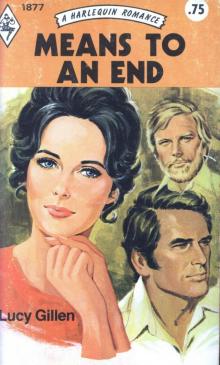 Means to an End
Means to an End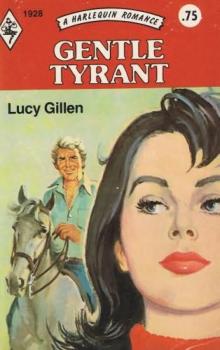 Gentle Tyrant
Gentle Tyrant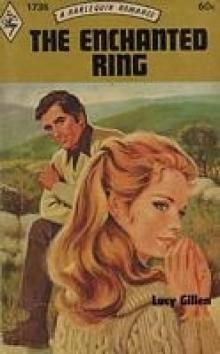 The enchanted ring
The enchanted ring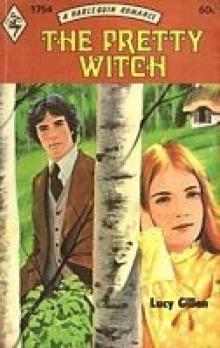 The pretty witch
The pretty witch The Runaway Bride
The Runaway Bride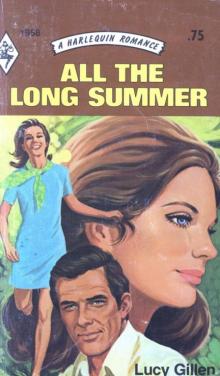 All the Long Summer
All the Long Summer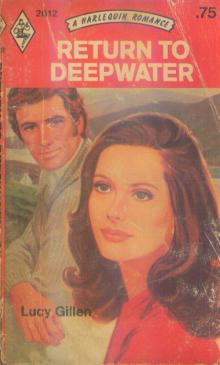 Return to Deepwater
Return to Deepwater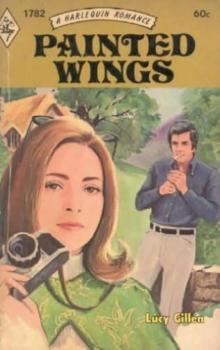 Painted Wings
Painted Wings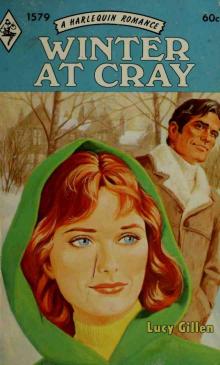 Winter at Cray
Winter at Cray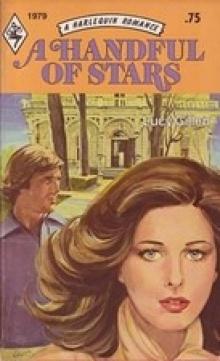 A handful of stars
A handful of stars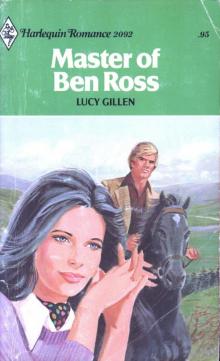 Master of Ben Ross
Master of Ben Ross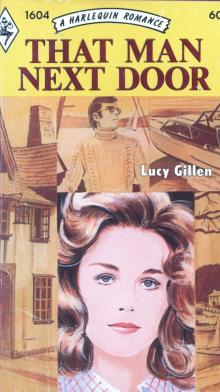 That Man Next Door
That Man Next Door